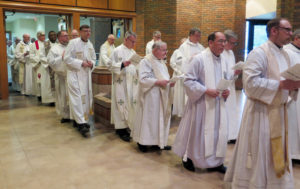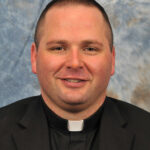By Fr. Joe Defrancisco
We are completing this Lenten series, which has focused on the integral connection between sacraments and justice in the church by writing a theological reflection on Catholic priesthood. Within our Catholic liturgical tradition, Lent officially ends on Wednesday of Holy Week.
The universal church then begins its celebration of the Easter Triduum, beginning with Holy Thursday, a re-enactment of the unfolding of Jesus’ Last Supper. We define our Christian memorial meal as Eucharist. The Holy Thursday celebration reminds us that Jesus instituted a “new priesthood.” He clothed himself in an apron, washed the feet of the disciples, and commissioned them to live and act as humble servants.

Priests of the Diocese of Davenport process into Our Lady of Victory Church in Davenport for the Chrism Mass April 3.
It was on Good Friday that he further expanded their priestly mission. By imitating the Good Shepherd they would be required to give their lives in unconditional love for the “sheep,” especially the lost sheep. When St. Pope John XXIII called the Second Vatican Council he famously coined a crucial word which memorialized that historical council. The word is known as “aggiornamento.” This Italian word translates “to bring up-to-date.”
There had been an ongoing, underlying call within and outside the church for decades to engage in a thorough and serious reform where reform was necessary and needed. The council introduced many new ideas but strategically engaged this process of reform by returning to some critical theological roots in the early church.
One theologically sound doctrine of priesthood was re-stated by the council in the Decree on the Ministry and Life of Priests. The document states clearly: “Our Lord Jesus makes His whole Mystical Body sharers in the anointing of the Spirit, wherewith He Himself was anointed: for in that Body all the faithful (baptized) are made a holy and kingly priesthood, they offer spiritual sacrifices to God through Jesus Christ, and they proclaim the virtues of Him who has called them out of darkness into His admirable Light. Therefore, there is no such thing as a member that has not a share in the mission of the whole Body” (D.M.P 1.2).
I proudly share with you as a local and not so famous theologian that a letter was sent to a previous bishop by one of my students in sacramental theology who condemned me a “heretic.” The student believed that I was teaching the false idea that baptized Christians are “also” priests. The student was brought up to believe that there is only one authentic priesthood, that of “ordained” ministry. This narrowly defined priesthood was frequently challenged and broadened in several of the council documents.
In addition, the history of the early church gives numerous examples of baptized Christians being “commissioned” for ministry in the church. At times, the laying on of hands by the community did anoint and ordain members for specific roles as episcopoi (administrators), as presbyteroi, (leaders of prayer and sacrament) and deaconoi (personal aids to the bishop and varied services to the community.)
Furthermore, the early Christian community laid hands on many other faithful workers who were discerned to possess “charismatic” gifts, directly given to individuals for the building up of community. In essence, there is now a clear and consistent theology of ministry that links the early beliefs and practices of our nascent church, with the most contemporary theological definitions emerging from Vatican II. The church is called upon to implement a shared ministry of both ordained and lay, who hold equal importance in the celebration and life of the church.
In another conciliar document, “Decree on the Apostolate of the Laity,” the all-inclusive theological nature of shared priesthood is again reaffirmed: “Because of their union to Christ, it is the laity’s right and duty to be apostles. By baptism they are the Mystical Body of Christ, strengthened by the power of the Holy Spirit in Confirmation and by the Word of Jesus Himself commissioned for an apostolate. They are consecrated a kingly priesthood and made a holy nation so that in all their actions they offer spiritual sacrifices and bear witness to Christ all over the world”(D.A.L. 1.3).
The earliest Christian communities exercised this shared ministry first and foremost in the celebration of Eucharist. Some local churches named this an “agape,” a love-feast. It was the duty of baptized faithful, deacons and elders to celebrate Eucharist often as a means of growing a community of love, teaching Jesus’ ideals of charity, mercy and compassion.
Having celebrated loving Communion, the community embraced the mission of sharing their love, resources, generosity and service to the most deprived and needy within and outside the community. Sacramental celebration and life required Christians to pour out their energies and service as a healing and antidote to social or religious injustices.
St. Paul’s infamous Letter to the Church of Corinth 11:17, whereby he is confronting and condemning the eucharistic community for not sharing and for using their liturgy of Communion to reinforce caste and economic divisions. Another Gospel narrative tells of Jesus celebrating a meal at the home of Simon, a leper, even though it was forbidden by Jewish kosher law. A woman entered to anoint his feet, perhaps as a sign of her desire to join his community, or as an act of penitence. She was shunned and Jesus was shamed for allowing her to pour this “extravagance” on him. Jesus rebuked the naysayers and praised the woman for her generosity of spirit (Matt.26:6). These and many other Scriptures reveal Jesus-priest as one who conjoins ministry and sacramental ritual with the many shades of injustice that needed to be addressed then and now.
In summary, I suggest three contemporary challenges to priestly ministry, both ordained and lay. First, there is a serious pastoral need for developing a crucial partnership between ordained and laity in fostering effective pastoral leadership. Faith communities need strong and skilled leaders to build up a community of love, educated faith and creative service to humanity. We must move our communities of faith to communities of healing humanity’s deprivations and illness.
Second, by joyfully, enthusiastically and zealously embracing the individual callings God has graced us with, priests, married couples, single men and women must become active evangelizers in recruiting young men and women to also answer God’s call in full-time or part-time ministry within and outside the church. Furthermore, the church has and will continue to equally support active apostolic life and contemplative religious life. Both are necessary for building up the Kingdom of God spiritually.
Finally, the whole Mystical Body of Christ, as church, cannot afford to neglect the critical mission of “ministering to the ministers.” Priests must support each other in prayer, fraternity, moral and spiritual support and, most of all, fraternal love. In turn, a spiritually empowered ordained priesthood must not neglect ministry and service to the co-ministers in the church who are sharing in and volunteering for the needs of the church and world. All those who accept God’s call to ministry through baptism or ordination cannot endure the counter-spiritual forces in the world without a strong commitment to reciprocal love, support, forgiveness, compassion and prayerfulness. Jesus offers to those of us in ministry the same warning he gave to the two sons of Zebedee: “From the same cup I drink of, you shall drink as well” (Matt. 20:23). There is no doubt Jesus is referring to the mysteries we are now celebrating within the Easter Triduum, the life, death and resurrection of our Lord and Savior. This enduring Paschal Mystery is our daily commitment to the priestly life of Jesus Christ.











